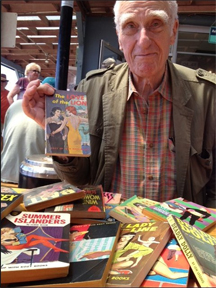Currently a freelance consultant and teacher, his clients include novelists, retired and active academics, and the humorist creator of one of the most popular television series of all time.Lowenkopf taught courses in short story, novel, dramatic writing, editing, genre fiction, and revision at the graduate level in one of the most prestigious writing programs in America at University of Southern California, where he was given a Lifetime Teaching Award. He has been a visiting professor at the College of Creative Studies, UCSB, since 2011.
He is a past regional president of the Mystery Writers of America; his book reviews have appeared in the Philadelphia Inquirer, the Fort Worth Star-Telegram, The National Catholic Reporter, The Los Angeles Times, the Los Angeles Herald-Examiner, Publishers’ Weekly, the Santa Barbara News-Press, and the Santa Barbara Independent. He has been the weekly reviewer for the Montecito Journal since 2005.
Lowenkopf has had over 35 books published, along with short fiction, pulp novels, essays and reviews. His most recent book, The Fiction Writer’s Handbook: The definitive guide to McGuffins, red herrings, shaggy dogs, and other literary revelations from a master, is a guide to terms, concepts, and forms related to storytelling.
 “The Fiction Writer’s Handbook by Shelly Lowenkopf is one of those rare reading experiences – insightful, unusually useful, and wise. If you’ve ever dreamed of writing, have begun to write, or a master looking for a fix, turn on your reading lamp and settle in for the night. You’ll thank me.” – Gayle Lynds, New York Times bestselling author of The Book of Spies
“The Fiction Writer’s Handbook by Shelly Lowenkopf is one of those rare reading experiences – insightful, unusually useful, and wise. If you’ve ever dreamed of writing, have begun to write, or a master looking for a fix, turn on your reading lamp and settle in for the night. You’ll thank me.” – Gayle Lynds, New York Times bestselling author of The Book of Spies
“Knowing how editors choose one work over so many others would give any writer an advantage. To that end, Lowenkopf, a longtime writer, editor, and educator, delivers the fiction-writing guide he has always longed for—one that can be applied to the practical goal of every aspiring writer: getting published. Arranged alphabetically, entries define and describe elements of editor-speak used by those in the know when judging a manuscript. Defining terms and ideas from “aftertaste” to “zeitgeist,” the handbook instructs and encourages beginner writers. An annotated bibliography punctuates this spirited read on what works and what doesn’t. VERDICT An invaluable insider’s take on what editors look for when sifting through the slush pile.” – Library Journal
Read Susan Finlay’s interview with Editor, Teacher, Author Shelly Lowenkop
